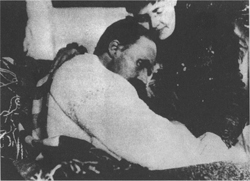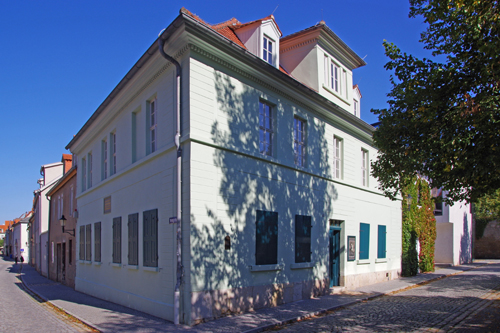
Your complimentary articles
You’ve read two of your four complimentary articles for this month.
You can read four articles free per month. To have complete access to the thousands of philosophy articles on this site, please
News
News: August/September 2024
Elixir of extended life for mice • Nicholas Rescher mini obituary • Nietzsche exhibition in his childhood home — News reports by Anja Steinbauer
Nietzsche Exhibition Opens

Journey’s end: Nietzsche back home in Naumburg some time after his collapse. Photo by Hans Olde.
Before Friedrich Nietzsche (1844-1900) became a famous philosopher and spent much of his life travelling and writing, he grew up in the small but beautiful town of Naumburg near Leipzig. Throughout his life he kept returning to his childhood home at Weingarten 18, and remained there permanently after his mental breakdown in 1889, being cared for by his devoted mother. The Nietzsche Haus is open to the public and since 2010 has also been the site of a documentation centre of Nietzsche writings. Now it houses a new exhibition – though contrary to conventional expectation, you won’t find items of furniture or Nietzsche’s personal effects there. Instead, the exhibition invites you to explore different aspects of Nietzsche’s life and thought by means of five pathways you can follow: Nietzsche’s Life, Nietzsche’s Animals, Nietzsche’s Things and Nietzsche’s Concepts, plus a pathway for children, which leads to mysterious objects such as a badger and an umbrella, stirring curiosity about their connection to the philosopher.
Nietzsche’s most famous concepts include the Übermensch (or ‘Overman’), the Last Man (who only wants a comfortable life), the Revaluation of All Values and of course Eternal Recurrence (which is either an odd, unevidenced metaphysical theory or else an inspiring thought experiment about the meaning of your life, depending who you ask). The Nietzche’s Animals path features a lifesized model of a horse. What finally pushed poor Freddy over the edge was the sight of a delivery man in Turin brutally whipping his horse. Nietzsche reportedly ran into the street, threw his arms around the horse to protect it, and then collapsed, never to fully recover. More about the exhibition can be found at nietzschehaus.de.

The house in Naumburg where Nietzsche grew up.
Photo © Thomas Hummel 2020. Creative Commons Licence 4.0
Life-Extending Drug?
Much research is currently devoted to trying to slow the ageing process in humans, and much philosophy to discussing the value of this pursuit. Now a team of scientists at the MRC Laboratory of Medical Science, Imperial College London and Duke-NUS Medical School in Singapore have been studying the effects on ageing of a natural protein called interleukin-11 (IL-11), which is produced in the liver and is associated with cell inflammation. As humans grow older, levels of this protein increase in the body, causing higher levels of inflammation which speeds the pace of ageing. The scientists conducted two experiments. In one, mice were genetically engineered so as to make their bodies unable to produce interleukin-11. In the other, 75-weeks old mice (the age equivalent to 55-year-old humans), were fed a drug to eliminate interleukin-11 from their systems. In both experiments, lifespans were increased by up to 20-25% and the mice were healthier than their control-group peers. Professor Anissa Widjaja, from Duke-NUS Medical School, comments: “Although our work was done in mice, we hope that these findings will be highly relevant to human health, given that we have seen similar effects in studies of human cells and tissues.”
Thus Spoke Chimpathustra
Reports suggest a small step forwards for humanity’s persistent attempts to communicate with other primates. The hope has been that this would advance our understanding of intelligence and of the nature of language. Many past experiments have attempted to teach sign language to chimpanzees. However, there have also been a few efforts to teach chimpanzees to speak actual words. One such involved a husband-and-wife team of zoologists who adopted a baby chimpanzee into their household in an attempt to teach language by total immersion. Such attempts appeared to have completely failed and have largely been abandoned, partly due to ethical concerns (for example, the baby chimpanzee had been removed from his mother). Indeed a debate has gone on ever since about why chimpanzees cannot learn to make words; some zoologists argue that it is due to the physiology of their throats, while others contend that their throats aren’t the problem, and it is because they lack the mental capacities needed for forming words and language.
To the surprise of both sides, an international team of researchers from Sweden and the UK have just reported that in reviewing hundreds of hours of old video footage from those earlier experiments, they did on rare occasions hear three different chimpanzees using simple words such as ‘mama’ and ‘cup’. It’s just that their pronounciation was terrible, which is why this wasn’t noticed sooner.
Nicholas Rescher Mini Obituary
Nicholas Rescher, for decades a professor at the University of Pittsburgh, was a German-born American philosopher whose interests ranged widely across different philosophical disciplines. His first work in philosophy was on medieval Arabic logic, and although his focus changed over time his concern with logic and analysis remained constant. Influenced by both Kant and Hegel, Rescher was also inspired by the American Pragmatism of C.S. Peirce, though he worked mainly with the methods of Analytical philosophy. His greatest contributions were in moral and social philosophy and philosophy of science, but he is also well known for his defence of the coherence theory of truth. This theory claims that a statement is true if it is coherent with a body of well-evidenced opinion. It is one of the main theories of truth along with its rivals the correspondence theory (which says a proposition is true if it corresponds to the way the world really is) and the pragmatic theory of truth.
Rescher was a very energetic organiser, networker and sustainer of the profession of philosophy. He founded several scholarly journals including the American Philosophical Quarterly and Public Affairs Quarterly. He served at different times as President of the American Philosophical Association, the American Catholic Philosophy Association, the Leibniz Society of North America, the Charles S. Peirce Society and more. He was a member of innumerable academies and scholarly societies around the world. As the influence of his ideas spread, he was, over the years, heaped high with many honours, even including the Order of Merit of the Federal Republic of Germany. He died on 5 January 2024 at the age of 95.









